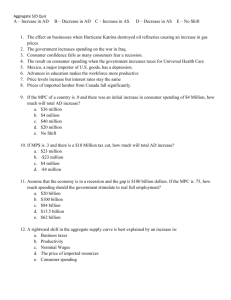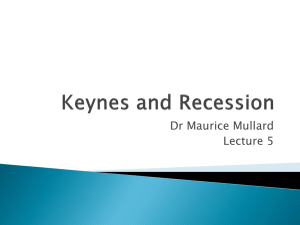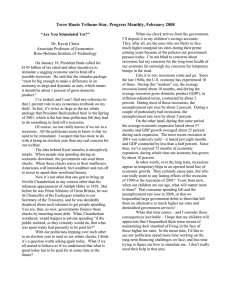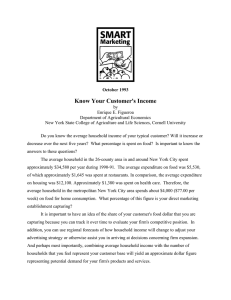Press Release Young cut back their spending most in recent recession
advertisement
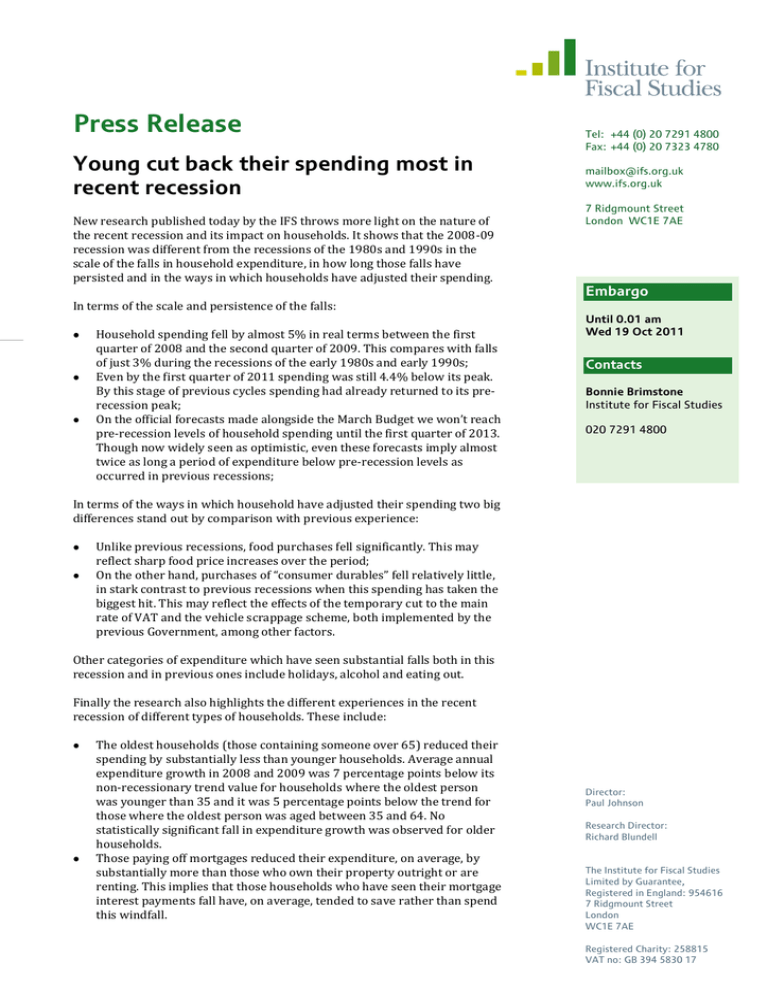
Press Release Young cut back their spending most in recent recession New research published today by the IFS throws more light on the nature of the recent recession and its impact on households. It shows that the 2008-09 recession was different from the recessions of the 1980s and 1990s in the scale of the falls in household expenditure, in how long those falls have persisted and in the ways in which households have adjusted their spending. In terms of the scale and persistence of the falls: Household spending fell by almost 5% in real terms between the first quarter of 2008 and the second quarter of 2009. This compares with falls of just 3% during the recessions of the early 1980s and early 1990s; Even by the first quarter of 2011 spending was still 4.4% below its peak. By this stage of previous cycles spending had already returned to its prerecession peak; On the official forecasts made alongside the March Budget we won’t reach pre-recession levels of household spending until the first quarter of 2013. Though now widely seen as optimistic, even these forecasts imply almost twice as long a period of expenditure below pre-recession levels as occurred in previous recessions; Tel: +44 (0) 20 7291 4800 Fax: +44 (0) 20 7323 4780 mailbox@ifs.org.uk www.ifs.org.uk 7 Ridgmount Street London WC1E 7AE Embargo Until 0.01 am Wed 19 Oct 2011 Contacts Bonnie Brimstone Institute for Fiscal Studies 020 7291 4800 In terms of the ways in which household have adjusted their spending two big differences stand out by comparison with previous experience: Unlike previous recessions, food purchases fell significantly. This may reflect sharp food price increases over the period; On the other hand, purchases of “consumer durables” fell relatively little, in stark contrast to previous recessions when this spending has taken the biggest hit. This may reflect the effects of the temporary cut to the main rate of VAT and the vehicle scrappage scheme, both implemented by the previous Government, among other factors. Other categories of expenditure which have seen substantial falls both in this recession and in previous ones include holidays, alcohol and eating out. Finally the research also highlights the different experiences in the recent recession of different types of households. These include: The oldest households (those containing someone over 65) reduced their spending by substantially less than younger households. Average annual expenditure growth in 2008 and 2009 was 7 percentage points below its non-recessionary trend value for households where the oldest person was younger than 35 and it was 5 percentage points below the trend for those where the oldest person was aged between 35 and 64. No statistically significant fall in expenditure growth was observed for older households. Those paying off mortgages reduced their expenditure, on average, by substantially more than those who own their property outright or are renting. This implies that those households who have seen their mortgage interest payments fall have, on average, tended to save rather than spend this windfall. Director: Paul Johnson Research Director: Richard Blundell The Institute for Fiscal Studies Limited by Guarantee, Registered in England: 954616 7 Ridgmount Street London WC1E 7AE Registered Charity: 258815 VAT no: GB 394 5830 17 Cormac O’Dea, a Senior Research Economist at the Institute for Fiscal Studies said “the pattern of household expenditure is crucial to understanding the path of the economy. It accounts for about 65% of GDP. Continued economic weakness has gone hand in hand with continued low levels of household spending and the drop in spending since 2008 has been unprecedented in recent history both in its scale and its persistence. “The type of cutbacks made by households also differed – in the most recent recession average food spending fell, something that did not happen in the previous two recessions. Durable purchases, which typically bear the brunt of consumer cutbacks in expenditure in recessions, were affected somewhat less this time around.” ENDS Notes to Editors: 1. The analysis was undertaken by Thomas Crossley, Hamish Low and Cormac O’Dea and is published as an IFS working paper titled “Household consumption through recent recessions” and is available under embargo (please contact bonnie_b@ifs.org.uk if you wish to receive a copy). This research was co-funded by the IFS Retirement Saving Consortium which comprises Age UK, Association of British Insurers, Department for Work and Pensions, Financial Services Authority, HM Treasury, Investment Management Association, Money Advice Service, National Association of Pension Funds, Partnership Pensions and the Pensions Corporation. Cofunding was also received from the ESRC-funded Centre for Microeconomic Analysis of Public Policy (CPP, reference RES-544-28-5001). 2. The definition of a recession applied here is the popularly-applied definition of a recession as a period of at least two consecutive quarters of negative GDP growth. The recessionary periods studied in the paper therefore are from 1980Q1 to 1981Q1; from 1990Q3 to 1991Q3 and from 2008Q2 to 2009Q3. The Institute for Fiscal Studies Limited by Guarantee, Registered in England: 954616 7 Ridgmount Street London WC1E 7AE
